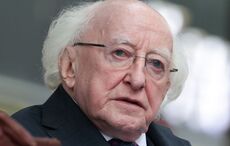Sinn Féin should focus on a long-term strategy that will see them entirely sever the established political order.
The world has changed drastically in the month since the Irish General election for the 33rd Dáil Éireann. The coronavirus has ravished Europe and Asia. Pubs are closed, football is postponed, and school is effectively on ice throughout the nation.
Yet, Ireland still faces uncertainty in forming a new government. Sinn Féin's left-leaning political platform brought incredible success in a groundbreaking election. Still, they do not have the required eighty seats to form a government. Even if the two largest parties, Fianna Fáil (38 seats) and Sinn Féin (37 seats), could agree to an alliance, they would not reach the magic number.
Read More: Varadkar wants to exclude Sinn Féin from national government to tackle COVID-19
In this time of uncertainty, Sinn Féin will have to plan out their next steps carefully. One option would be to play the long game by allowing Fine Gael and Fianna Fáil to form their government. This scenario may seem to defy logic at first; after all, Sinn Féin has the most votes in a split election, but it may be the best option in the face of Brexit and coronavirus disease.
At the moment, any coalition led by Sinn Féin would be doomed to fail. To achieve a relatively leftist agenda, they would have to rely on smaller parties, such as the Social Democrats, the Green Party, and People Before Profit, to make it close to the 80-seat margin. If this grand alliance could be formed, they would still need twelve of the nineteen independent candidates to join their side. This is too many cooks in the kitchen, and it would dilute the potency of Sinn Féin's political platform.
An alternative partnership between Sinn Féin and Fianna Fáil would cause more problems than it would solve. For example, Sinn Féin won more votes in the election, but Fianna Fail holds more seats. It would be difficult to determine the junior partner in such a government because both parties consider themselves the winner. The two parties could create a "rotating taoiseach," where each party takes turns leading the government, but this would likely result in a lack of practical implementation of Sinn Féin's policies.
Either option creates a weak government that cannot fulfill promises on issues such as housing, homelessness, healthcare, and a united Ireland. Sinn Féin would face backlash over such a failure, similar to that of Nick Clegg's Liberal Democrats after their fragile coalition with the Conservatives in Westminster.
Read More: Sinn Féin rallies have the Irish establishment running scared
Instead, Sinn Féin should focus on a long-term strategy that will see them entirely sever the established political order. The party could allow Fianna Fáil and Fine Gael to form a center-right partnership. The two parties have held power in Ireland since the inception of the independent nation, but their popularity has waned due to austerity measures that hurt Ireland's most vulnerable. If Fianna Fáil and Fine Gael formed a government without Sinn Féin, they would prove themselves to be an "old boys club" that was willing to ignore the "democratic mandate of Sinn Féin."
Mary Lou Mcdonald, the leader of Sinn Féin, has already sowed the seeds of undermining a center-right coalition by stating "people voted for change and not a grand coalition between Fianna Fáil and Fine Gael." McDonald and her party could capitalize on the establishment's attempts to portray them as unfit radicals.
Fianna Fáil and Fine Gael continuously urged Sinn Féin to return to government in the North of Ireland during the Stormont crisis between 2017 and 2019. Yet, both parties now insist that Sinn Féin is unfit to govern in the South. This paradox could be exploited to demonstrate that the established elite dislike the idea of a "northern party" holding power "down here." McDonald could contend that Fianna Fáil and Fine Gael are effectively admitting the people in the North are second class citizens and alienating Irish Republicans in the South.
Read More: Irish Americans astonished by the demonization of Sinn Féin
Moreover, Sinn Féin will likely benefit from journalists, politicians, and pundits unfairly portraying the party as a far-right anti-democratic machine. Ruth Dudley Edwards has likened Sinn Féin's rise "to that of Nazis in the 1930s." Unjust comparisons to the Nazis will make Sinn Féin more sympathetic. Despite Ruth Dudley Edwards' claims, Sinn Féin has been elected to seats in Stormont and Westminister for over twenty years. Sinn Féin is more akin to the African National Congress (ANC) under Nelson Mandela, who abandoned violence in favor of joining democratic institutions, than right-wing movements in Europe.
Notwithstanding this crude fearmongering and the attempt to paint Sinn Féin as part of the populist right, the party ran a successful political left-leaning campaign. Their manifesto included massive public investment to deal with a dire housing crisis and a collapsing health system. Their TDs and MPs in the North and South have eschewed anti-immigrant rhetoric, supported same-sex marriage, and condemned racism. One Sinn Féin TD, Martin Kenny, suffered an arson attack after denouncing racism.
Polls have consistently shown that young voters are not stuck on the "historical links between Sinn Féin," so unwarranted attacks by journalists and politicians appear as desperate and petty. Indeed, many Irish people support the party because they are tired of the snobbish entitlement of political correspondents such as John Drennan, who suggested that working-class Sinn Féin supporters existed on a diet of "chips, Dutch Gold and batter burgers." Michael Martin, Ruth Dudley Edwards, and John Drennan seem politically out of touch when they focus on links between Sinn Féin and the IRA. Mary Lou McDonald can use her opponent's lack of concentration on real political solutions to develop Sinn Féin into the party of the "ordinary people" that could dominate the North and South in the future.
Perhaps most importantly, Sinn Féin may decide to remain outside of government in the South due to the uncertainty of the economy following Brexit and the coronavirus pandemic. Economists currently project that the next five years will see the Irish economy decline by 7 percent. The Irish agricultural sector has lost more than $500 million worth of exports since Brexit, and this may get significantly worse. The parties that form a coalition government will have to deal with the increasing financial burden and political uncertainty of Brexit. Sinn Féin should avoid this issue because it is optimal for emergent political parties to mastermind economic growth and political stability. Hence, they can become viable alternatives to the established order.
Moreover, British nationalist rhetoric since Brexit has reminded Irish people of questions surrounding their own issues of self-determination in the North. Fine Gael has demonstrated that they are out of touch with most Irish people by proposing to commemorate police officers who fought against the IRA during the revolutionary period. This has spectacularly backfired, and Sinn Féin could gain more support from future mishaps by allowing the center-right to navigate the complicated web of Brexit.
Read More: Fianna Fail’s Micheál Martin speaks the Sinn Féin truth
Overall, Sinn Féin's popularity is on the rise, and their political assent seems imminent, but they should not sacrifice long-term goals for short-term gain. A coalition between Fianna Fáil and Fine Gael could be a blessing to Sinn Féin. This would ensure Fianna Fáil and Fine Gael appear undemocratic and unwilling to embrace change. The weak coalition would lack the popular support needed to face challenges arising from the political and economic turmoil of Brexit. McDonald could watch from the sidelines while pushing the party's working-class agenda at the expense of businesses.
Danny McCoy has argued that Sinn Féin's anti-business policies would negatively target "higher taxes to the few." Therefore, McCoy believes Fianna Fáil and Fine Gael are the parties of "the few" while Sinn Féin is the party of "the many." The unwillingness of Sinn Féin to place the corporate agenda over working people facing homelessness and austerity will guarantee them a massive tidal wave of support within the next few years.
The growing desire for political and economic transformations throughout Irish society means there will undoubtedly be an election within the next few years, if not the next few months. Sinn Féin could use patience and strategic thinking to topple any weak coalition in the aftermath of Brexit. They could allow popular discontent to continue to rise as Fianna Fáil and Fine Gael engage in one last power grab. The long game would ultimately place Sinn Féin in the perfect position to achieve its long-term goal of creating a left-leaning united Ireland.
Read More: Mary Lou's fiery speech on Sinn Fein's right to be in office reaches over one million
This article was submitted to the IrishCentral contributors network by a member of the global Irish community. To become an IrishCentral contributor click here.




Comments